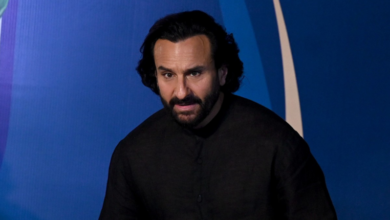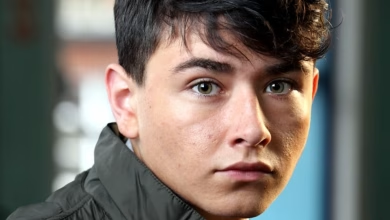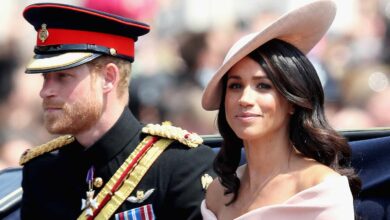Last night of the Proms: Sweltering heat fails to dampen the audience’s spirits
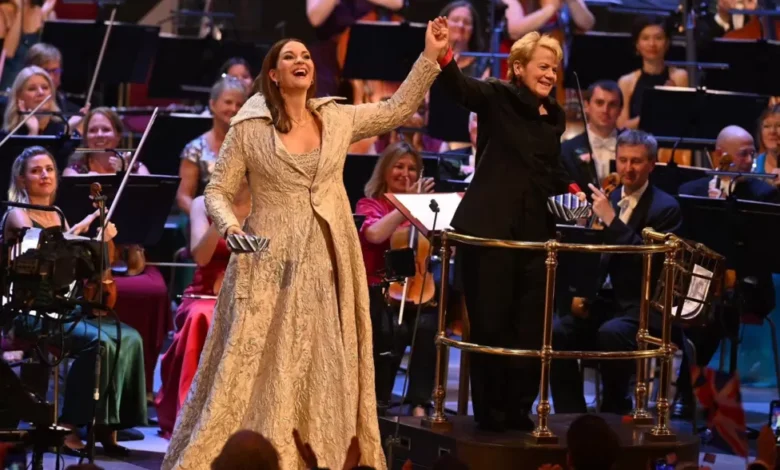
The stifling heat of the Royal Albert Hall failed to dampen the spirits of eager Prommers, who celebrated the festival’s Last Night in typical style.
With temperatures in the 30s, the crowd nonetheless stomped, clapped and blew comedy horns throughout the traditional closing singalongs.
Their enthusiasm delighted conductor Marin Alsop, who ordered several impromptu encores.
She later paid tribute to the “wonderfully robust” audience.
Many had queued from early in the morning to obtain one of the Proms’ on-the-day tickets, which only offer standing access to the auditorium.
“You have to stand the whole time,” Alsop marvelled. “That’s amazing because my feet are killing me, I don’t know about you.”
The audience also gave Alsop an extended ovation as she remarked that 2023 marked the 10th anniversary of her becoming the first woman to conduct the Last Night of the Proms.
“Apparently it’s worthy of inclusion in the Guinness Book of Records,” she said.
“And as silly as that is, it reminds me of how much work remains to build a more equitable world for the next generations.”
BBC Singers shine
There was also a show of support for the BBC Singers, who played a crucial role at the concert months after being threatened with closure as part of BBC cost-cutting measures.
They won a temporary reprieve in March when external organisations approached the corporation to suggest alternative funding models.
The choir’s conductor, Sofi Jeannin, says the finer details of those discussions are still being ironed out – but that she’s optimistic for the future.
“We are being told that the corporation is looking for longevity,” she told BBC Radio 4’s Front Row.
“We have been assured that we can continue programming in the future – and we are planning our centenary concert for next year.”
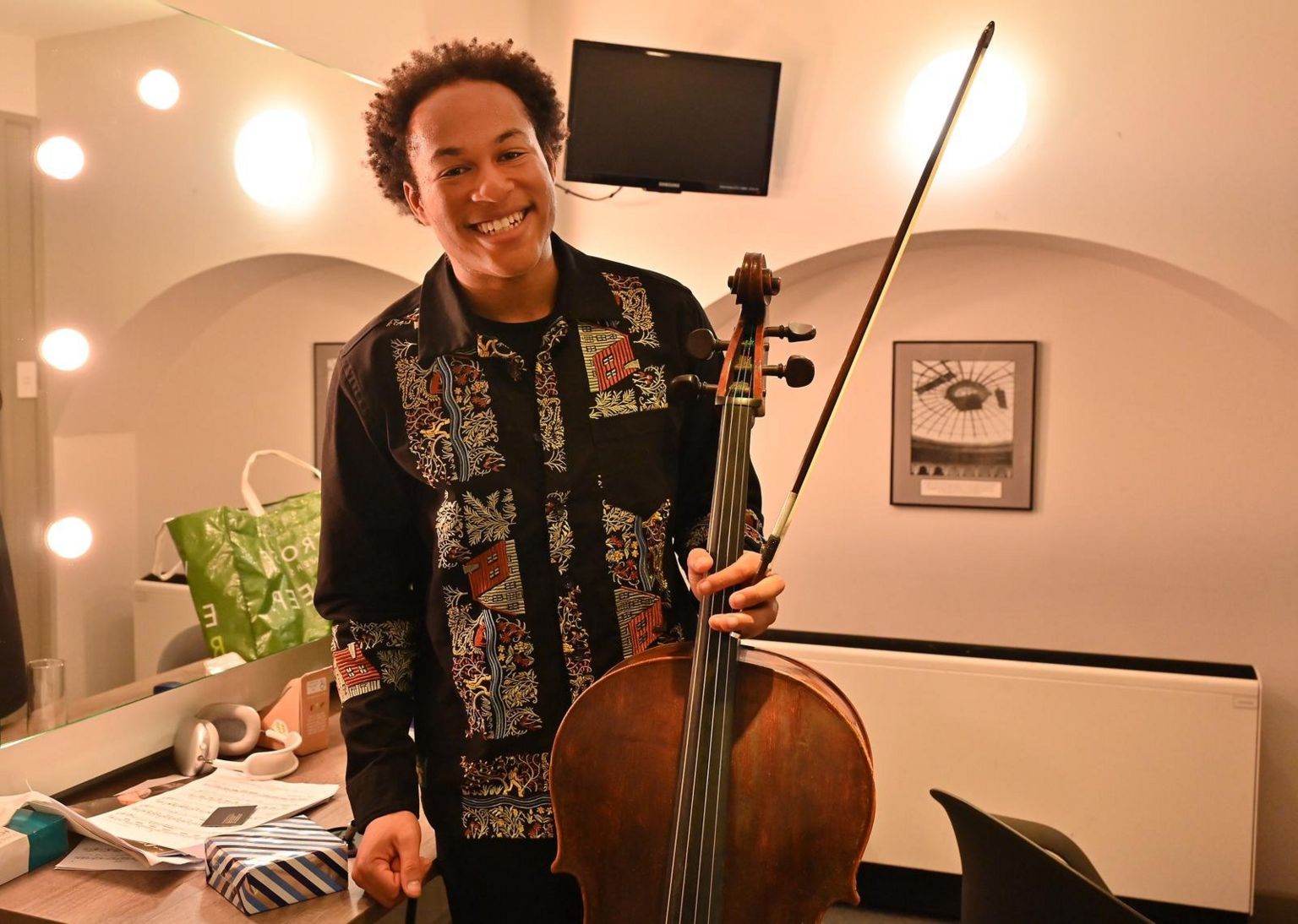
Saturday’s concert marked the first full-scale Last Night of the Proms since 2019, after some events were curtailed by Covid, and last year’s show was cancelled after the death of Queen Elizabeth II.
It opened on Richard Strauss’s swashbuckling tone poem Don Juan, with the BBC Symphony Orchestra painting a pulse-quickening portrait of the promiscuous Spanish hero.
Sheku Kanneh-Mason then gave a rich, sumptuous rendition of Max Bruch’s Kol Nidrei, emphasising the warmth and humanity of the ancient Hebrew melodies.
And soprano Lise Davidsen captivated the hall with the rich beauty of her voice, as she reprised the aria that propelled her to fame in 2015: Dich, teure halle, from Wagner’s opera Tannhäuser.
In fact, the Norwegian singer conspired to steal the show, with knock-out performances from Verdi’s Macbeth and Mascagni’s Cavalleria Rusticana, that provided ample evidence of why she’s become one of opera’s most in-demand stars.
However, she dispensed with the Last Night tradition of dressing up in national costume (“I’m not going as a troll or a Viking!” she said), opting instead for a series of opulent ball gowns.
One particularly voluminous scarlet dress drew gasps of admiration from Radio 3 presenter Georgia Mann, who commented: “I’m surprised she hasn’t knocked over any music stands yet”.
“It’s the largest, broadest, grandest dress I have ever seen,” added her co-presenter Petroc Trelawny.
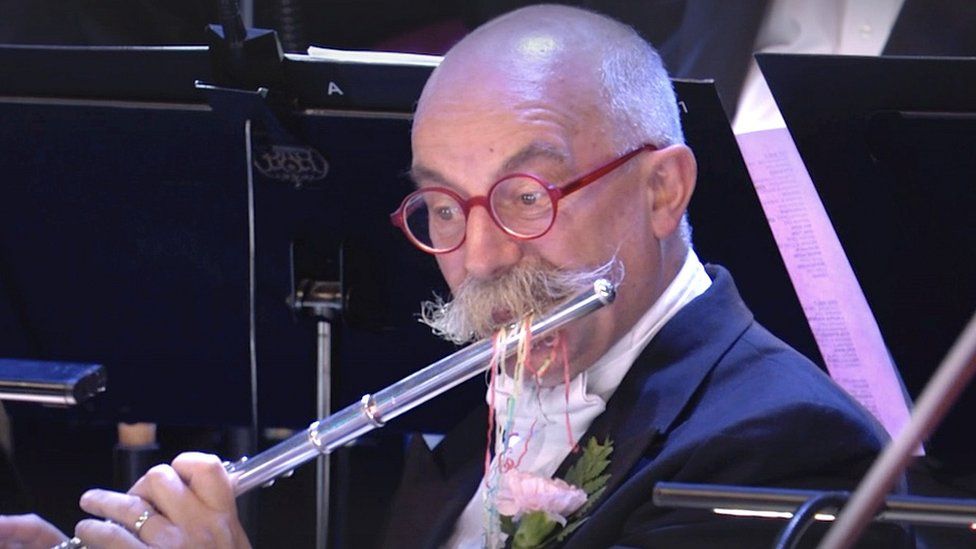
The programme also featured several world premieres, including the theme music for the upcoming superhero film, The Marvels.
Kanneh-Mason performed his part of the rhythmically-driven score from a B-stage in the middle of the auditorium, illuminated by LED wristbands that had been handed out to the audience at the start of the show.
The bands continued to pulse with colour as Davidsen performed the rambunctious Heia, heia, in den Bergen (Hey, in the mountains).
Then the two soloists came together on the elegantly lyrical Bachianas Brasileiras, before the traditional medley of sea songs kicked off the beloved crowd participation sequence.
Hundreds of flags waved in time to Rule, Britannia! and Pomp and Circumstance – with South Africa, Ireland, the USA, Norway, the EU and dozens of other nations represented.
And eagle-eyed viewers spotted the BBC Symphony’s lead flautist Michael Cox heroically soldiering through the final stretch, after party streamers threatened to clog up his mouthpiece.
The night concluded with the first performance of God Save The King at the Proms since 1951, followed by the traditional chorus of Auld Lang Syne.
The best bits of the 2023 Proms
This year saw the Proms spread its geographical wings further than before, with concerts in Londonderry, Great Yarmouth, Perth, Truro, Aberystwyth and a weekend-long residency at the Sage Gateshead.
Overall, there were 84 concerts, performed by 37 orchestras, featuring more than 3,000 musicians.
Ticket sales rose above pre-Covid levels, with 350,000 people attending a show.
Highlights of the season included:
- Mariza sings Fado: A passionate and fiery evening of Fado music, otherwise known as the”Portuguese blues”. The concert was fronted by Fado legend Mariza, whose agile vocals and sparkling charisma lit up the Royal Albert Hall.
- Chineke blow the roof off: The Chineke! orchestra’s youthful energy brings a whole new energy to well-loved classics. This year, the ensemble played Beethoven’s Fourth Symphony and Haydn’s exuberant Trumpet Concerto. Keep an eye out for soloist Aaron Azunda Akugbo, who tackles the piece with unmissable flair.
- A night of Northern Soul: “Orchestral versions of pop music can feel a little bit contrived,” admitted BBC 6 Music’s Stuart Maconie, who co-curated this second concert of the Proms. “Northern Soul, absolutely not, because so many of the original records feature orchestration, so its in the vocabulary already.”
- Four Seasons in One Day: Well, one night to be strictly accurate, but Finnish conductor and violinist Pekka Kuusisto’s unconventional approach shone new light on Vivaldi’s masterpiece. Wearing leather trousers and radiating with enthusiasm, he gave cittern player Ale Carr freedom to improvise over familiar passages, then joined him in those improvisations – at one point riffing on Vaughan Williams’ The Lark Ascending.
- Self Esteem at the Sage Gateshead: Rebecca Lucy Taylor, aka pop provocateur Self Esteem, admitted to being “quite nervous” as she began her first concert with a live orchestra, but she needn’t have worried. Her confrontational, feminist pop was somehow even more emotionally devastating with the addition of the Northern Sinfonia’s orchestral [expletive deleted] Wizardry.
- Simon Rattle’s farewell: One of the year’s most emotional Proms, as Sir Simon Rattle bowed out as Music Director of the London Symphony Orchestra. He chose to depart with Mahler’s valedictory Symphony No 9. When it ended, the hall sat in silence for 30 seconds. The end of an era.
The Proms will return next year on Friday, 19 July.





